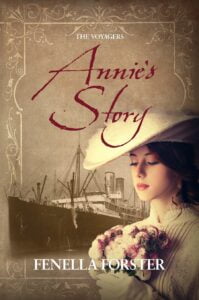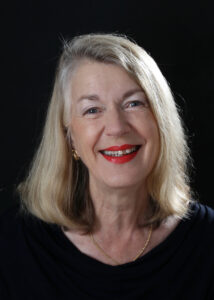British indie author of fiction and non-fiction, Denise Barnes
Like many indie authors, British writer Denise Barnes has published books in more than one genre. Here she explains an interesting and unexpected – even to her – relationship between her fiction and non-fiction books.
When you walk into a bookshop, it’s fascinating to see such an overwhelming selection of titles and subjects that must have been the passion for all those authors who’ve spent months and years creating them.
It’s led me to mulling over the reasons why I write the kinds of books I do, both fiction and non-fiction.
First, the Memoirs
My first two books published were memoirs.

Denise Barnes' memoir of a business nightmare
I wrote from Bad to Wurst: Bavarian Adventures of a Veggie Cook when so many people begged me to write a book about my time at a German sanatorium in 1972, as they couldn’t believe some of the funny stories I used to tell them. And because the experience formed an important healthy foundation for me that has so far lasted 45 years, I’m bound to enjoy re-reading that year of my life when I’m old and decrepit!
- My sister persuaded me to write the second one, Seller Beware: How Not To Sell Your Business. I sold my thriving estate agency business that I’d built up to eight branches over 17 years to a pair of conmen. This dragged me into a 3-year nightmare where I desperately and unsuccessfully tried to claw back the substantial amount of money they owed me. Writing the book was a cathartic exercise and helped me get over the bitterness and regain my reputation (many people thought I had gone bankrupt when those tricksters finally did a moonlight flit).
My Transition from Non-Fiction to Fiction

The first in Denise's historical fiction trilogy (Fenella Forster is her pen-name for fiction)
When I sat down, very excited, to write fiction I thought I was going to write a romantic comedy. I love writing humour and couldn’t wait to get started on my first novel. But when I was looking for a subject, two Edwardian pictures of a passenger ship on my writing cabin wall made the decision for me. I would base it on my grandparents, who were in service and had sailed to Australia on that ship ‘to better themselves’. The subject was obviously not suitable for rom-com, so a gritty saga about a housemaid called Annie pushed itself on to my computer screen. Every so often I’d think, ‘Where on earth did that all come from?’
Digging deep into a couple of pretty awful life experiences (we all have them), I began to realise I was making my heroine go through some of the pain I’d suffered. I think I was intrigued to see how she would cope. But it wasn’t until I wrote the third book of The Voyagers Trilogy that I consciously chose to give the Italian hero the same name as one of ex-boyfriends, also Italian, who had caused me untold shock and misery.
Amazingly, using his name, has worked. Partly, I suppose, because I gave my hero in the novel his full name, which I used to shorten in real life. But I can type and read that name now without feeling the old sick despair. Also, I never knew the true answer to the big question: Why? in the real life story. Well, being a writer I’ve fictitiously answered that question and created a happy ending, and even though the novel is set in a different era, it’s almost as though it might have, could have, actually happened to me,
It probably sounds fanciful, but it was an immensely satisfying novel to complete, and has somehow helped lay my own ghost to rest.
Just wonder what dark secrets and lies will emerge in the next novel I write. Whatever they are, my heroine will be ready to meet them – head on. And I’ll be with her every step of the way!
OVER TO YOU If you write non-fiction and fiction, is there any relationship between them, or do you compartmentalise them?
Interesting case study for #authors who write both #fiction and #non-fiction - with @DeniseBarnesUK Share on X







I’ve never written non-fiction, but real-life incidents do find their way into my fiction. Sometimes I choose it, other times I don’t recognize my own life in there until the story is done and i look back on it, wondering, when did that sneak in there? ;-}
[…] https://selfpublishingadvice.org/writing-why-i-write-what-i-write-with-denise-barnes/ […]
My first novel came out of a painful marriage. I wrote it as therapy and used the series to resolve another relationship. It worked and laid the ghosts. That first book is darker than those which followed, but that was necessary for the healing of my psyche.
I had been writing non-fiction for twenty years in the field of education, and knew that writing a novel was an essential next step for me. I set my first novel in the area where I live, and used as its starting point an incident involving the re-building of the village school in 1937. I drew the details from a little local booklet, and began weaving fictional characters into the historical setting. Thus began a combination of non-fictional background events with the fictional story, which carried me through three books. The last of these, Fallout, was set, in part, inside the nuclear plant at Windscale at the time of the disastrous reactor fire of October 1957. This event is relatively recent, some of the details are well-known locally, and I had to decide how to create a fictional story around it that was as authentic as I could manage, out of respect for the people I met and knew of who were working there at the time.
Combining non-fiction and fiction is a challenge I’ve enjoyed, and still relish, even though the local setting makes it even more necessary to do the necessary careful research, and to respect my neighbours. West Cumbria is a wonderful part of the world and I still want to live here!
Interesting that you use both your own experience and that of others to create fiction. Which do you enjoy writing most – fiction or non-fiction?
Nice to hear from you, David. I love writing non-fiction – I adore writing fiction! I think that’s the best answer I can give.
How about you?